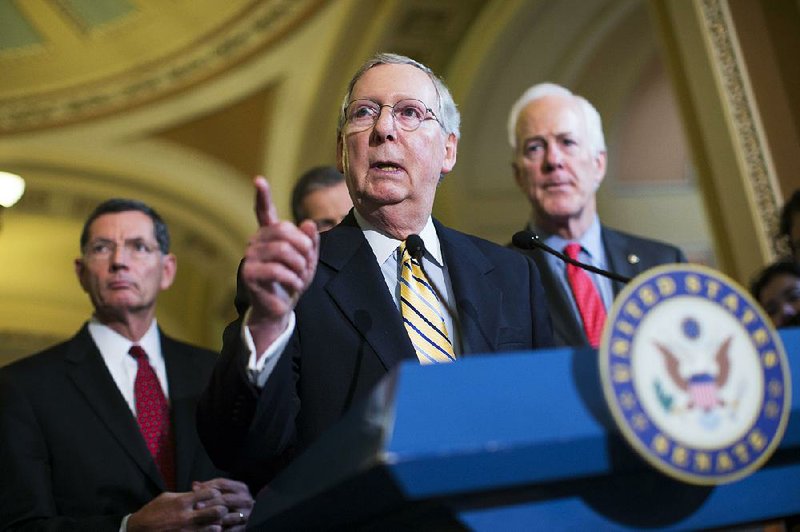WASHINGTON -- Senate leaders announced a deal Tuesday that they said should clear the way for the long-stalled vote on President Barack Obama's attorney general nominee.
The agreement aims to solve a dispute over abortion that had delayed passage of a once-popular human-trafficking bill for weeks. Attorney general nominee Loretta Lynch has been caught in the middle, with Republican leaders insisting on holding off on her confirmation vote until the trafficking bill was resolved.
"I'm glad we can say there is a bipartisan proposal that will allow us to complete action on this important legislation so we can provide help to the victims who desperately need it," said Majority Leader Mitch McConnell, R-Ky.
He said he expected a vote on Lynch, who would be the nation's first black female attorney general, "in the next day or so."
"Let's get out of this quickly," said Democratic leader Harry Reid of Nevada. "Let's get Loretta Lynch confirmed."
Lynch, the top federal prosecutor in Brooklyn, N.Y., was nominated last fall, and Democrats have become increasingly agitated about the delays in confirming her to replace Eric Holder. However, Democrats controlled the Senate for part of that time and failed to call her nomination up for a vote.
Obama on Friday called the delays "embarrassing."
The trafficking deal aims to address Democratic concerns that the legislation would expand existing prohibitions on spending federal funds for abortions. The legislation envisions a new victims fund made up of fees paid by sex criminals, and Democrats said applying abortion-spending prohibitions to that new source of nontaxpayer funds was an expansion they could not accept.
Republicans said they had to be satisfied that abortion-spending prohibitions were not curtailed.
The final language, negotiated by Reid and Sens. John Cornyn, R-Texas, and Patty Murray, D-Wash., resolves that issue by establishing two sources of money for the new victims fund.
Money collected from the fines assessed on criminal perpetrators would be used for services such as legal aid, but not for health or medical services, and therefore language on abortion would not be relevant. Money already appropriated by Congress for Community Health Centers -- and already subject to abortion-spending restrictions -- would be available for health and medical services.
Obama spokesman Josh Earnest said the White House was reserving judgment until it had a chance to review the final language in the deal, but he also said the endorsement from some Democrats was "certainly an encouraging sign."
"If we see strong Democratic support, including from champions for women's health care like Patty Murray, that certainly seems like the kind of thing the president would be able to support," Earnest said.
The trafficking bill, which passed in the Senate Judiciary Committee unanimously, had appeared headed for quick passage through the Senate earlier this year until Democrats started raising alarms about the abortion language.
They contended Republicans had sneaked it into the bill, although Democratic Sen. Amy Klobuchar's office has acknowledged that an aide was aware of it. Outside interest groups, including Planned Parenthood, got involved and the bill stalled.
Tuesday's deal allows all sides to claim victory: Republicans for ensuring money for medical procedures is subject to the existing abortion restriction, under a rule known as the "Hyde amendment," and Democrats for establishing that the Hyde restriction isn't expanded to a new source of money.
Klobuchar took credit for the two-part approach, which she said in an interview came to her as she was driving through a cornfield in her home state of Minnesota. But officials in other offices involved credited Cornyn, Reid, Murray and their aides for negotiating the agreement.
Planned Parenthood applauded the deal.
"Thankfully, Sens. Reid and Murray and other women's health champions held the line and today's agreement prevents Hyde from being extended even further into other funding streams, and provides survivors of human trafficking with immediate access to needed health care services," said Cecile Richards, president of Planned Parenthood Action Fund.
Klobuchar, who has made sex trafficking a major focus, also applauded the deal.
"There are a lot of people on both sides of the aisle who care deeply about supporting victims of trafficking," she said, "and I am pleased that we have finally been able to come together to find a resolution that will allow us to move this important legislation forward."
Klobuchar said final language needs to be worked out and that the measure could be passed in the next day or day and a half, setting up a vote on Lynch's confirmation.
Lynch, 55, is supported by 51 senators, including all 46 Democrats and five Republicans -- enough to win confirmation.
But many of the Senate's Republicans have questioned Lynch's independence and criticized her support of the president's immigration policy.
In November, Obama deferred deportation for three years for about 5 million illegal aliens -- those who came to the U.S. as children, and parents of people who are citizens or legal permanent residents. Republicans including Sen. Jeff Sessions of Alabama consider the policy to be unlawful "amnesty."
Lynch, at her Jan. 28 confirmation hearing, said that focusing immigration enforcement and deportation on dangerous and violent criminals was "a reasonable way to marshal limited resources to deal with the problem."
Information for this article was contributed by Erica Werner and Josh Lederman of The Associated Press; by Jennifer Steinhauer and Emmarie Huetteman of The New York Times; and by Kathleen Hunter, Mike Dorning and James Rowley of Bloomberg News.
A Section on 04/22/2015


